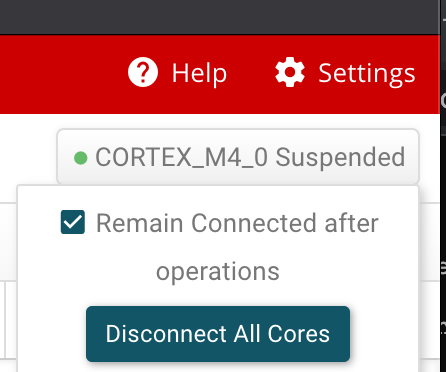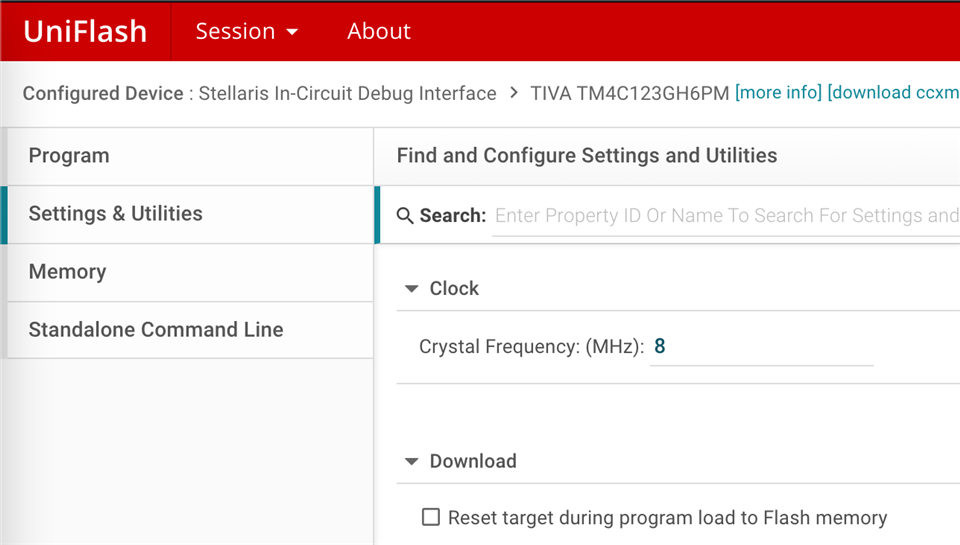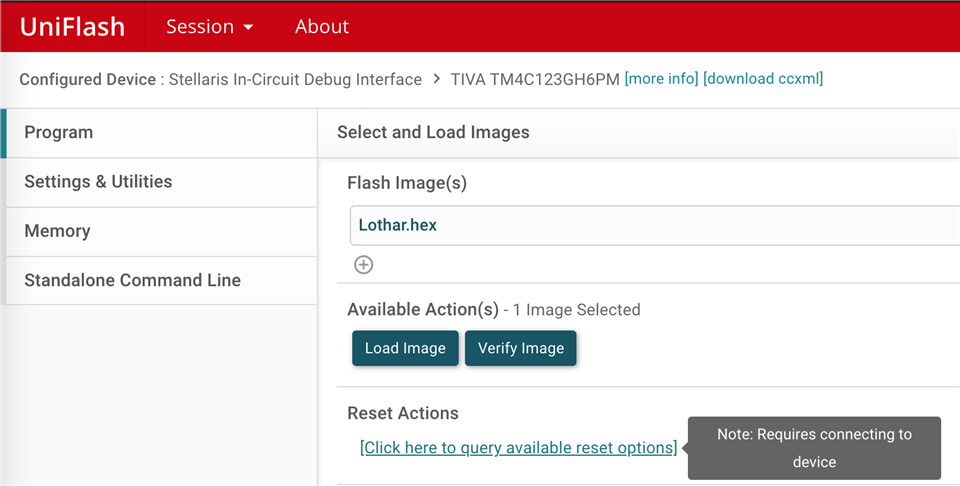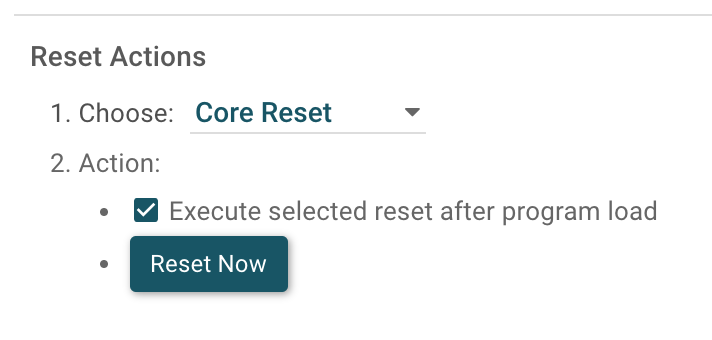Other Parts Discussed in Thread: UNIFLASH, CCSTUDIO
Hello
I have a minimal program which fits in the first kB. The hex-tools output produces the intel hex file. It shall be loaded with Uniflash.
However, the .hex file is somehow not written, the memory region from 0x00 to 0x400 remains cleared (0xff).
If I try with the .out file it works. If I try with a greater .hex file (merging multiple hex files, the region after 0x400 is correctly written.
10:11:16:153 log - NWAgentAPI: dinfraConfigue resolved successfully.
10:11:16:311 error - {}
10:11:16:322 error - {}
10:11:16:331 error - {}
10:11:16:332 error - {}
10:11:16:355 error - {}
10:11:16:359 error - {}
10:11:16:389 error - {}
10:11:16:390 error - {}
10:11:16:398 error - {}
10:11:16:402 error - {}
10:11:16:405 error - {}
10:11:16:412 error - {}
10:11:16:413 error - {}
10:11:16:783 error - {}
10:11:16:809 error - {}
10:11:16:811 error - {}
10:11:16:815 error - {}
10:11:16:820 error - {}
10:11:16:822 error - {}
10:11:16:828 error - {}
10:11:16:829 error - {}
10:11:16:830 error - {}
10:11:16:830 error - {}
10:11:17:008 error - {}
10:11:17:008 error - {}
10:11:17:009 error - {}
10:11:17:009 error - {}
10:11:17:030 error - {}
10:11:17:326 error - {}
10:11:18:639 error - {}
10:11:18:647 error - {}
10:11:19:587 error - {}
10:11:19:632 error - {}
10:11:19:708 error - {}
10:11:19:733 error - {}
10:11:19:734 error - {}
10:11:19:885 error - {}
10:11:19:893 error - {}
10:11:19:894 error - {}
10:11:20:822 error - {}
10:11:20:825 error - {}
10:11:21:758 error - {}
10:11:21:761 error - {}
10:11:21:821 error - {}
10:11:21:824 error - {}
10:11:21:926 error - {}
10:11:21:929 error - {}
10:11:21:929 error - {}
10:11:23:539 error - {}
10:11:23:543 error - {}
10:11:23:543 error - {}
10:11:24:929 error - {}
10:11:24:942 error - {}
10:11:24:942 error - {}
10:11:25:334 error - {}
10:11:25:337 error - {}
10:11:25:337 error - {}
10:11:25:706 error - {}
10:11:25:707 error - {}
10:11:28:266 error - {}
10:11:35:050 debug - Target Configuration. Device: tm4c123bh6zrb, Connection: TIXDS2XXUSB_Connection, LP: false
10:11:35:196 debug - ufDS, session.configured, partnum of current session = tm4c123bh6zrb
10:11:35:224 debug - addTargetStateListener on CORTEX_M4_0
10:11:35:279 error - {}
10:11:36:811 error - {}
10:11:36:814 error - {}
10:11:42:488 debug - returning new configure
10:11:45:238 debug - configured
10:12:01:338 debug - returning cached configure
10:12:01:642 debug - connect to core CORTEX_M4_0
10:12:05:919 debug - returning cached configure
10:12:05:922 debug - returning cached configure
10:12:06:058 debug - connect to core CORTEX_M4_0
10:12:06:113 debug - InitMemoryBrowser {"pageInfoList":[{"addrSize":32,"isDefault":true,"mauSize":8,"name":"RAM","wordSize":32}]}
10:12:06:114 debug - currentValTypeLength = 4 currentMAUSize = 1 currentCellSize = 4
10:12:06:114 debug - , options=undefined
10:12:06:114 debug - memory browser: readMem: rowIdx=0, rowCount=150, page=RAM
10:12:06:114 debug - currentValTypeLength = 4 currentMAUSize = 1 currentCellSize = 4
10:12:06:114 debug - returning cached configure
10:12:06:253 debug - connect to core CORTEX_M4_0
10:12:06:367 debug - reRenderTable: 8
10:12:06:368 debug - , options=undefined
10:12:06:368 debug - memory browser: readMem: rowIdx=0, rowCount=150, page=RAM
10:12:06:368 debug - currentValTypeLength = 4 currentMAUSize = 1 currentCellSize = 4
10:12:06:368 debug - returning cached configure
10:12:06:497 debug - connect to core CORTEX_M4_0
10:12:12:794 error - {}
10:12:12:798 error - {}
The console output shows no warnings or errors also when selecting verbose.
I use the XDS200 debug probe (USB) by blackhawk.
Thanks for any help
Best regards
Lothar















